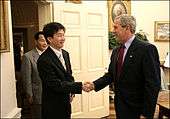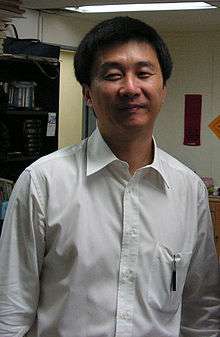Kang Chol-hwan
| Kang Chol-hwan | |
|
Kang in 2014 | |
| Korean name | |
|---|---|
| Hangul | 강철환 |
| Hanja | 姜哲煥 |
| Revised Romanization | Gang Cheol-hwan |
| McCune–Reischauer | Kang Ch'ŏl-hwan |
Kang Chol-hwan (born 1968) is a defector from North Korea. As a child, he was imprisoned in the Yodok concentration camp for 10 years. After his release he fled the country, first to China and eventually to South Korea. He is the author, with Pierre Rigoulot, of The Aquariums of Pyongyang and worked as a staff writer specialized in North Korean affairs for the The Chosun Ilbo. He is now the president of North Korea Strategy Center (NKSC).
Early life


According to his autobiography, Kang was born in Pyongyang, North Korea, and spent his childhood there. His family lived in relative luxury from his grandfather's position and the fortune that he had given to the country upon the family's return from Japan. Though they had never renounced their North Korean citizenship and Kang's grandmother had been a staunch party member in both countries, Kang has stated that the family remained under a cloud of suspicion for having lived in Japan.
Concentration camp
In 1977, his grandfather was accused of treason and was sent to the Senghori concentration camp. According to current KCNA, the elder Kang was an agent of the Japanese National Police.[1] As the family of a traitor, Kang, 9, and his family were sent to the Yodok concentration camp. His sister, Mi-ho, was just 7.
Kang's autobiography describes a brutal life in the camp. Death from starvation or exposure to the elements was a constant threat, with routine beatings and other punishments. His education consisted almost solely of memorizing the sayings and speeches of Kim Il-sung; at 15, his education ceased and he was assigned to exhausting and dangerous work details, and was made to view public executions. He said of the camps, "It was a life of hard labour, thirty percent of new prisoners would die. And we were so malnourished, we would eat rats and earthworms to survive."[2] After ten years of imprisonment, he and his family were released.
Release
After release from the camp, Kang lived for a few years in North Korea. He owned an illegal radio receiver and listened to broadcasts from South Korea. In 1992, he and fellow Yodok internee An Hyuk escaped from North Korea by crossing the Yalu River into China. Kang then moved to South Korea.[3]
After publishing The Aquariums of Pyongyang, Kang met with US President George W. Bush[4] and British Foreign Secretary Jack Straw.[5] He has spoken with several organizations about human rights in North Korea[6][7] and visited Japan for a discussion about abductees.[8]
Kang has not been in contact with his family since he defected. In 2011, it was revealed that his sister, Mi-ho, and her 11-year-old son are believed to be at Yodok concentration camp.[9]
Bibliography
- Kang, Chol-Hwan (2001). The Aquariums of Pyongyang. Basic Books, 2001. ISBN 0-465-01102-0.
- "Give Us An 'Eclipse Policy'", The Wall Street Journal, July 13, 2005.
See also
References
- ↑ Useless and foolish smear campaign, 1999-05-06, retrieved 2011-07-16
- ↑ "'Life of hard labour' in North Korean camp". BBC News. May 3, 2011.
- ↑ 양정아 (2005-06-15), "부시와 면담, 강철환은 누구인가? 함남 요덕 수용소 출신, 現 <북한민주화운동본부> 공동 대표", Daily NK, retrieved 2010-02-26
- ↑ "The Chosun Ilbo (English Edition): Daily News from Korea".
- ↑ "Foreign Secretary of the UK Jack Straw Meets North Korean Gulag Survivor".
- ↑ "Blogger".
- ↑ Republicans Abroad Korea: Kang Chol-hwan reception a success
- ↑ "North Korea defectors say don't trust regime's claims on abductees". The Japan Times.
- ↑ http://www.fidh.org/IMG/pdf/petition_to_unwgad.pdf Petition To: United Nations Working Group on Arbitrary Detention
External links
- "Child Prisoner: Kang Chol-hwan", MSN.com article, October 28, 2003.
- "Bush 'Moved By Defector's Book on N.K. Human Rights'", The Chosun Ilbo, May 29, 2005.
- "Ban Downplays Bush Meeting With N.Korean Author", The Chosun Ilbo, June 15, 2005.
- Kang Chol-hwan Freedom Collection interview